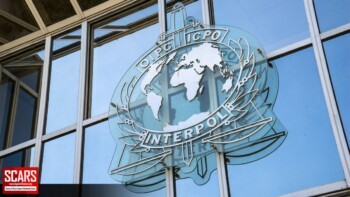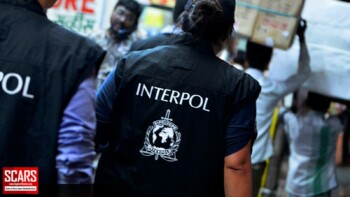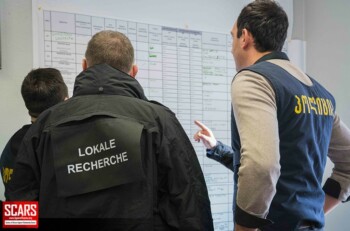INTERPOL-Coordinated Operation Saw 22 Jurisdictions Around The World Cooperate To Swiftly Intercept The Illicit Proceeds Of Online Fraud
Interpol has coordinated the arrest of 1,003 individuals linked to various cyber-crimes such as romance scams, investment frauds, online money laundering, and illegal online gambling.
This crackdown results from a four-month action codenamed ‘Operation HAEICHI-II,’ which took place in twenty countries between June and September 2021.
On the financial aspect of the operation, the authorities have also intercepted nearly $27,000,000 and froze 2,350 banking accounts linked to various online crimes.
As the Interpol announcement details, at least ten new criminal modus operandi were identified in HAEICHI-II, indicative of the evolving nature of cyber-crime.
Taking Place Over 4 Months
Taking place over four months from June to September 2021, Operation HAECHI-II brought together specialized police units from 20 countries, as well as from Hong Kong and Macao, to target specific types of online fraud, such as romance scams, investment fraud, and money laundering associated with illegal online gambling.
In total, the operation resulted in the arrest of 1,003 individuals and allowed investigators to close 1,660 cases. In addition, 2,350 bank accounts linked to the illicit proceeds of online financial crime were blocked. More than 50 INTERPOL notices were published based on information relating to Operation HAECHI-II and 10 new criminal modus operandi were identified.
The following countries participated in Operation HAECHI-II:
- Angola
- Brunei
- Cambodia
- Colombia
- China
- India
- Indonesia
- Ireland
- Japan
- Korea (Rep. of)
- Laos
- Malaysia
- Maldives
- Philippines
- Romania
- Singapore
- Slovenia
- Spain
- Thailand
- Vietnam
SCARS sources also indicate there these arrested and the seizure of records and devices may lead to another 20,000 arrests over the next two years.
Race Against Time
Far from the common notion of online fraud as a relatively low-level and low-stakes type of criminality, the results of Operation HAECHI-II show that transnational organized crime groups have been using the Internet to extract millions from their victims before funneling the illicit cash to bank accounts across the globe.
In a single case in Colombia, a prominent textiles company found itself defrauded of more than USD 8 million through a sophisticated business email compromise scam. The perpetrators impersonated the legal representative of the company, giving the order to transfer more than USD 16 million to two Chinese bank accounts. Half of the money was transferred before the company uncovered the fraud and alerted the Colombian judicial authorities, which in turn quickly contacted INTERPOL’s financial crime unit through their National Central Bureau (NCB) in Bogota.
Leveraging the new ARRP network, international police cooperation channels were activated between INTERPOL bureaus in Beijing, Bogota and Hong Kong to freeze the transferred funds. Thanks to this new network, which streamlines police communication in international stop payment cases, over 94 per cent of the money was intercepted in record time, saving the Colombian company from bankruptcy.
“Intercepting the illicit proceeds of online financial crimes before they disappear into the pockets of money mules is a race against time and we have worked closely with the Attorney General’s Office to move as decisively as possible,” said General Jorge Luis Vargas Valencia, Director General of the Colombian National Police.
“Given the high level of complexity of coordination with law enforcement units and banking institutions on the other side of the world, INTERPOL’s coordination role has been essential to achieving this result,” added Francisco Barbosa, Attorney General of Colombia, whose office oversaw the case.
In another case, a company in Slovenia was duped into transferring more than USD 800,000 to money mule accounts in China. Again, as the Slovenian Criminal Police opened an investigation and reached out to their foreign counterparts through INTERPOL and other channels, streamlined coordination through China’s INTERPOL NCB in Beijing allowed local authorities to successfully intercept and return the stolen funds to Slovenia in full.
Squid Game
Interpol said that the close collaboration between specialized police units around the world “also generated significant intelligence on emerging trends in online financial crime”.
Based on information gained during Operation HAECHI-II, the agency published multiple Purple Notices, which are international police alerts that seek or provide information on modus operandi, objects, devices, and concealment methods used by criminals.
The notices are then shared with Interpol’s 194 member countries so that police can exchange information on emerging criminal methods and establish connections between cases.
Months of close collaboration between specialized police units around the world also generated significant intelligence on emerging trends in online financial crime. Based on information gained during Operation HAECHI-II, INTERPOL published multiple Purple Notices – international police alerts that seek or provide information on modus operandi, objects, devices, and concealment methods used by criminals. The notices are then shared with INTERPOL’s 194 member countries so that police can exchange on emerging criminal methods and establish connections between cases.
International Fraud
One notable example of fraud unearthed in HAEICHI-II involves a Colombian textiles company tricked by BEC (Business Email Compromise) actors.
The perpetrators impersonated a legal representative of the company and asked $16 million in two payments of $8,000,000 to be sent to two Chinese bank accounts.
Interpol’s intervention helped retrieve 94% of this amount, saving the firm from bankruptcy.
In another case, a Slovenian firm was deceived into transferring $800,000 to money mule accounts in China. Interpol worked with the authorities in Beijing and helped return the full amount to the victim.
A rising trend the investigators noticed during HAEICHI-II was using the ‘Squid Game’ as a theme for malware distribution campaigns.
The actors took advantage of the popularity of the Netflix show to masquerade trojanized apps that were supposedly mobile games.
In reality, these apps automatically subscribed users to ‘premium’ services and inflate their bills, while their distributors cash in from affiliations.
“Online scams like those leveraging malicious apps evolve as quickly as the cultural trends they opportunistically exploit,” said José De Gracia, Assistant Director, Criminal Networks at Interpol.
“Sharing information on emerging threats is vital to the ability of police to protect the victims of online financial crime. It also lets police know that no country is alone in this fight. Operation HAECHI-II shows that we can successfully strike back against this threat when we act together.”
HAEICHI-I
Interpol’s previous large-scale online fraud crackdown operation was HAEICHI-I, spanning between September 2020 and March 2021.
That operation involved 40 law enforcement officers and focused predominately on the Asia Pacific region, resulting in 500 arrests.
The amount of money intercepted was $83,000,000, while the authorities also identified and froze 1,600 bank accounts belonging to fraudsters.










Leave A Comment